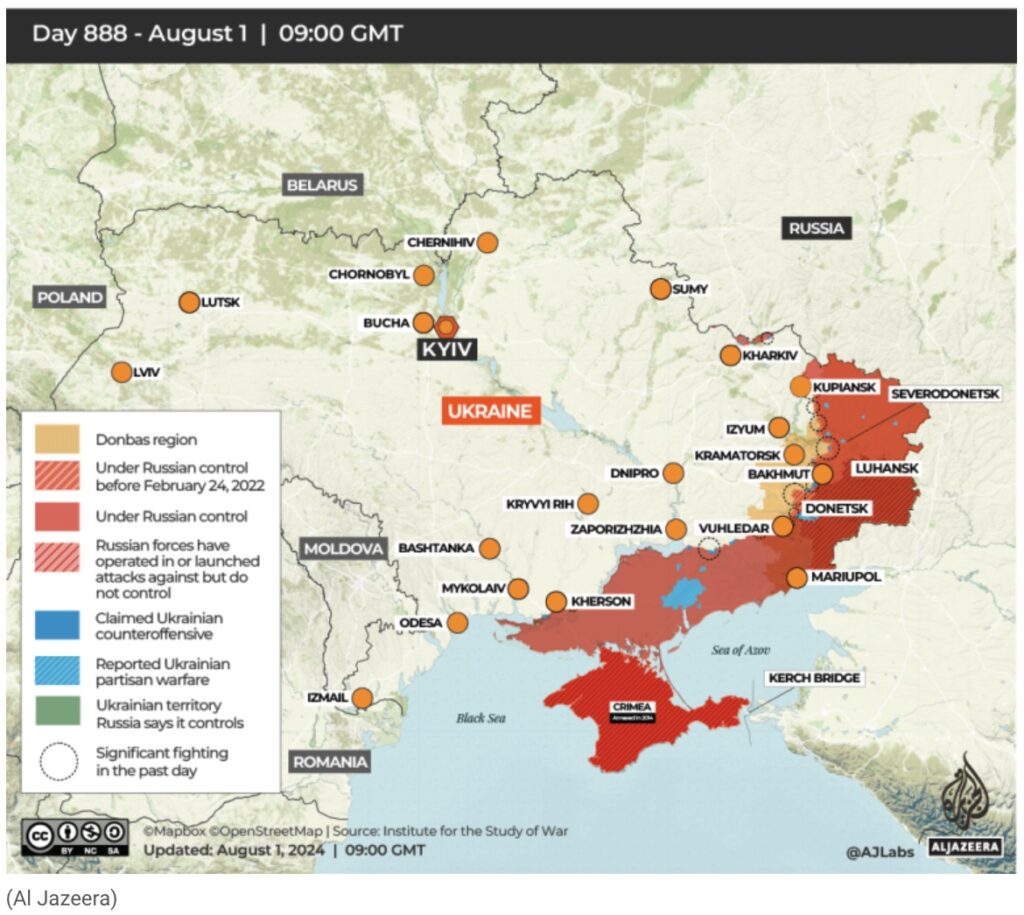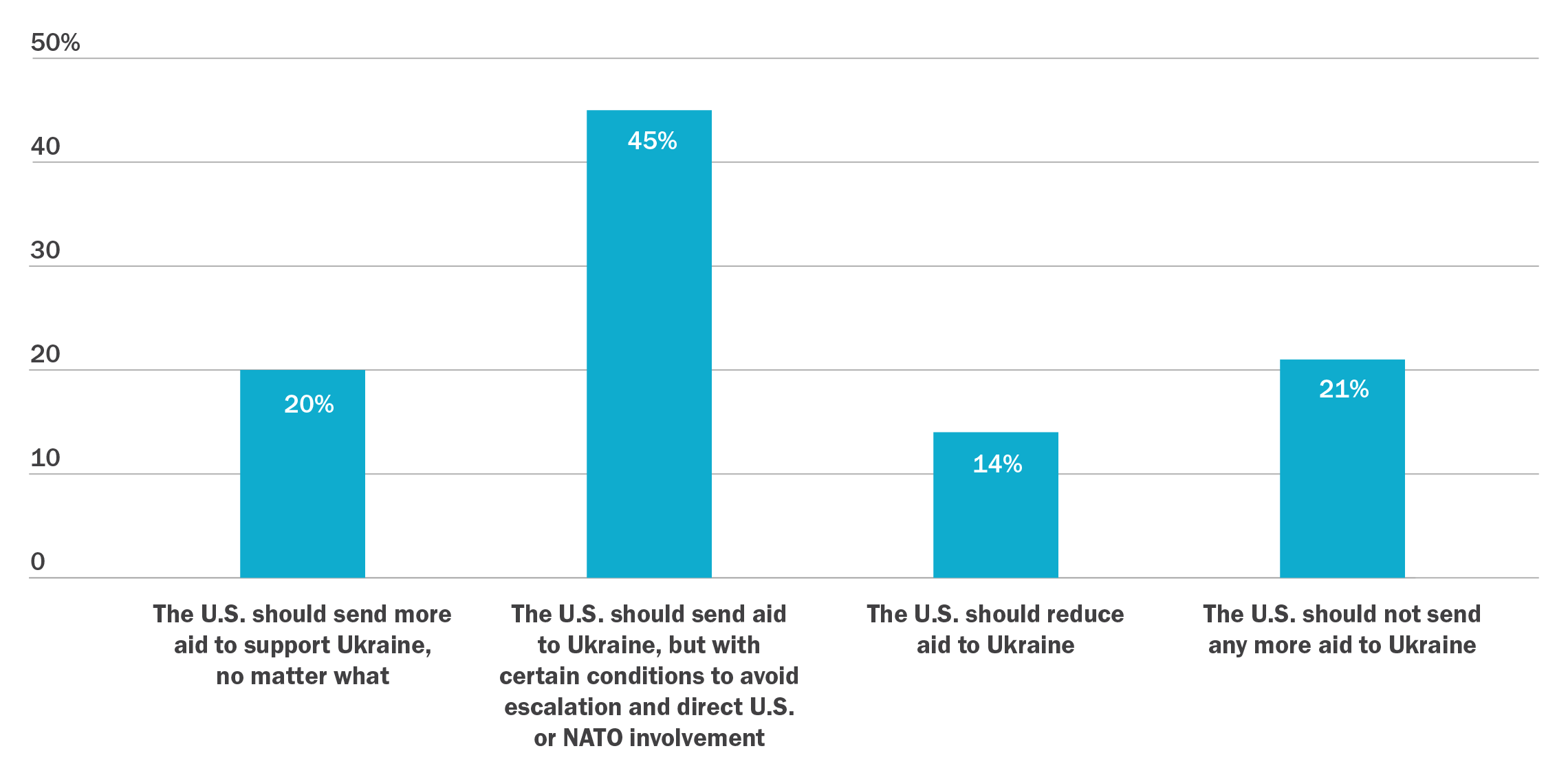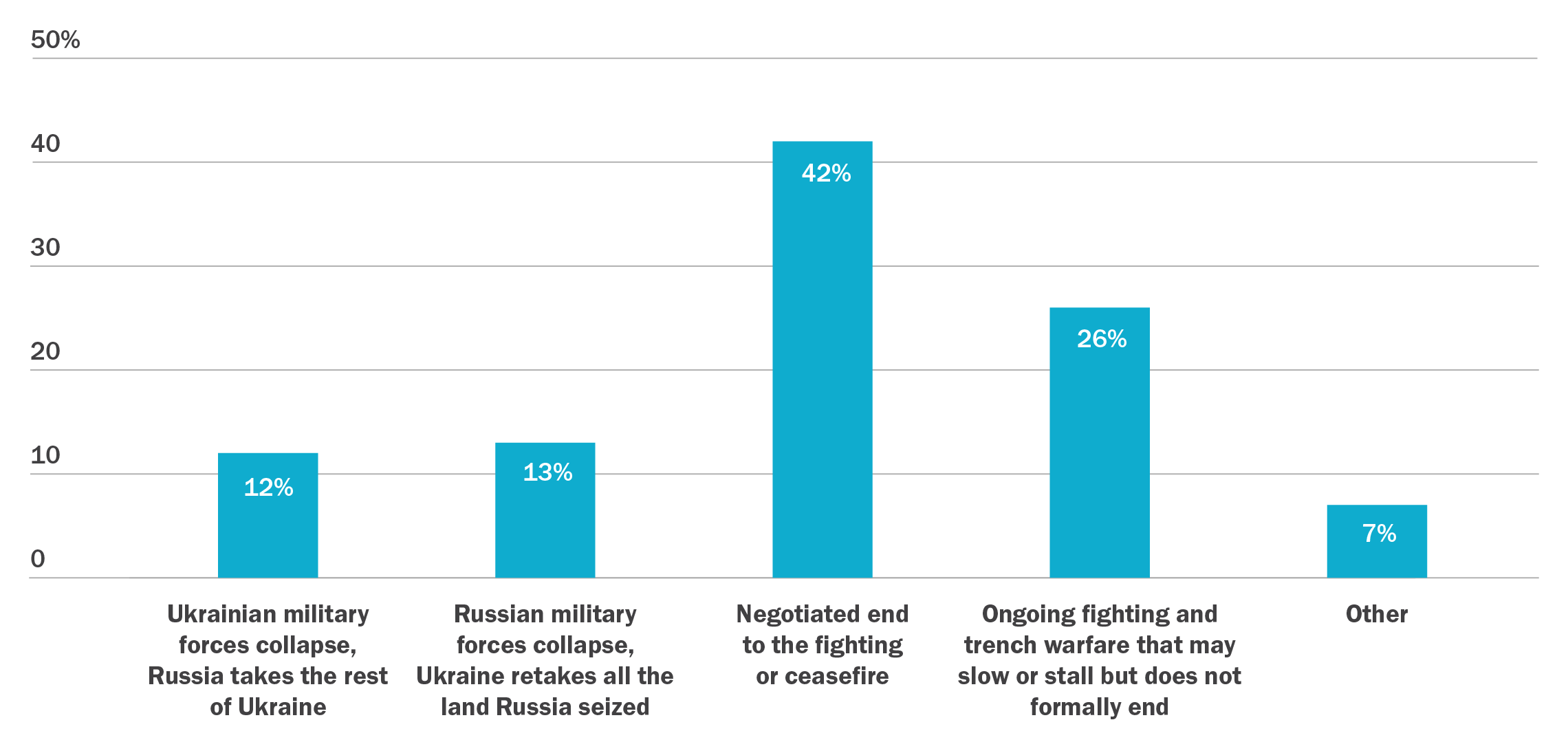
POLL: SIGNIFICANT GAP BETWEEN THE AMERICAN PUBLIC’S FOREIGN POLICY PREFERENCES AND ELITE POLICYMAKING
KEY TAKEAWAYS
- 80% of respondents believed the U.S. should either make aid to Ukraine conditional, reduce aid, or cut aid to Ukraine entirely.
- More than 50% of respondents did not think Ukraine can win the Ukraine-Russia War, only 12% thought the war would end in a Ukrainian victory, and significantly more than 50% felt either the war would end through negotiations/ceasefire or continue with ongoing fighting via trench warfare.
- Only 39% of respondents thought the U.S. had a strategy for the Ukraine-Russia War.
- 50% of respondents opposed deploying troops from NATO countries to Ukraine because Ukrainian troops could not be trained outside of Ukraine.
- 46% of respondents felt it was not operationally necessary for soldiers from NATO countries to deploy to Ukraine, and only 17% thought it was operationally necessary.
- More than 50% of respondents did not think the U.S. should defend Ukraine if it meant increasing the risks of a Russian nuclear strike on a U.S. city.
- Only 30% of respondents felt the U.S. should defend Taiwan against a Chinese invasion despite the potential costs and only 21% felt Taiwan’s political autonomy was more important than the U.S. avoiding war with China.
- Nearly 50% of respondents believed the U.S. should use its leverage to encourage Israel to avoid war with Hezbollah.
- 81% of respondents did not think the U.S. should commit to sending U.S. service members into combat to defend Saudi Arabia.
BACKGROUND
U.S. foreign policymaking is an insiders’ game, usually conducted without much input from the American people or consideration for their viewpoints.
To better understand the general public’s feelings on various pressing foreign policy issues and to assess the degree of disconnect between elites and the public, Defense Priorities commissioned YouGov to conduct a survey of the foreign policy opinions of 1,000 voting age Americans.
Respondents were polled between July 18, 2024 and July 24, 2024 about their feelings on the United States’ role in the world and its handling of a range of issues from a rising China to the Ukraine-Russia War to the present turmoil in the Middle East.
Unsurprisingly, the survey results show the United States’ foreign policy approach is largely at odds with, and unresponsive to, the preferred policies of the American people, who generally support a more judicious, discerning foreign policy than the one currently pursued by foreign policy insiders.
METHODOLOGY
YouGov interviewed 1,176 respondents who were then matched down to a sample of 1,000 to produce the final dataset. The respondents were matched to a sampling frame on gender, age, race, and education. The sampling frame is a politically representative “modeled frame” of U.S. adults, based upon the American Community Survey (ACS) public use microdata file, public voter file records, the 2020 Current Population Survey (CPS) Voting and Registration supplements, the 2020 National Election Pool (NEP) exit poll, and the 2020 CES surveys, including demographics and 2020 presidential vote. The matched cases were weighted to the sampling frame using propensity scores. The matched cases and the frame were combined and a logistic regression was estimated for inclusion in the frame. The propensity score function included age, gender, race/ethnicity, years of education, region, and home ownership. The propensity scores were grouped into deciles of the estimated propensity score in the frame and post-stratified according to these deciles.
The weights were then post-stratified on 2020 presidential vote
choice as well as a four-way stratification of gender, age
(4-categories), race (4-categories), and education (4-categories),
followed by a two-way stratification of race (4-
categories), and education (4-categories), to produce the final weight.
ON THE UKRAINE-RUSSIA WAR
80% of respondents believed the U.S. should either make aid to Ukraine conditional, reduce aid, or cut aid to Ukraine entirely.
Question: Which of the following best describe your views about future U.S. support for Ukraine?

More than 50% of respondents did not think Ukraine can win the Ukraine-Russia War, and only 12% thought the war would end in a Ukrainian victory, and significantly more than 50% felt either the war would end through negotiations/ceasefire or continue with ongoing fighting via trench warfare.
Question: Which of the following do you think is the most likely outcome of the Ukraine-Russia War?

Only 39% of respondents thought the U.S. had a strategy for the Ukraine-Russia War.
Question: Do you think the U.S. has a strategy for Ukraine-Russia War?
![]()
50% of respondents opposed deploying troops from NATO countries to Ukraine because Ukrainian troops could not be trained outside of Ukraine.
Question: To what extent do you agree or disagree with the following statement: Soldiers from NATO countries should not be deployed to Ukraine (even for training purposes) because Ukrainian troops can be trained outside of Ukraine (e.g., in Poland) at less risk to NATO personnel.

46% of respondents felt it was not operationally necessary for soldiers from NATO countries to deploy to Ukraine, and only 17% thought it was operationally necessary.
Question: To what extent do you agree or disagree with the following statement: Soldiers from NATO countries should not be deployed to Ukraine (even for training purposes) because it is not operationally necessary and could be a tripwire that leads to direct NATO-Russia conflict.
![]()
More than 50% of respondents did not think the U.S. should defend Ukraine if it meant increasing the risks of a Russian nuclear strike on a U.S. city.
Question: To what extent do you agree or disagree with the following statement: The U.S. should help defend Ukraine even if it means a greater risk that the U.S would have to absorb a nuclear strike from Russia on a U.S. city.

ON A TAIWAN CONTINGENCY
Only 30% of respondents felt the U.S. should defend Taiwan against a Chinese invasion despite the potential costs, and only 21% felt Taiwan’s political autonomy was more important than the U.S. avoiding war with China.
Question: A) Defending Taiwan could risk nuclear war with China, lead to the deaths of thousands of U.S. service members and cost the U.S. billions of dollars. To what extent do you agree or disagree with the following statement: The United States should use its military to defend Taiwan against a Chinese invasion regardless of the costs and consequences. B) To what extent do you agree or disagree with the following statement: Avoiding war with China, which could go nuclear, is more important than Taiwan’s political autonomy from Beijing.

ON THE ISRAEL-HAMAS WAR
Nearly 50% of respondents believed the U.S. should use its leverage to encourage Israel to avoid war with Hezbollah.
Question: Israel and Hezbollah—the terrorist group which controls southern Lebanon—are on the precipice of a major war. The United States is likely to be drawn into any such conflict in an effort to protect Israel. To what extent do you agree or disagree with the following statement: U.S. should use its leverage to encourage Israel to not expand the conflict into Lebanon by going to war with Hezbollah.

ON A POTENTIAL SECURITY GUARANTEE FOR SAUDI ARABIA
81% of respondents did not think the U.S. should commit to sending U.S. service members into combat to defend Saudi Arabia.
Question: The U.S. is currently contemplating giving the Kingdom of Saudi Arabia a security guarantee, a formal commitment to come to Riyadh’s defense if it is attacked. Should the U.S. commit to sending U.S. service members into combat to fight and die to defend Saudi Arabia?
![]()
Visit the Ukraine-Russia, Israel-Hamas, and China policy pages to view more analysis on these topics.
No comments:
Post a Comment